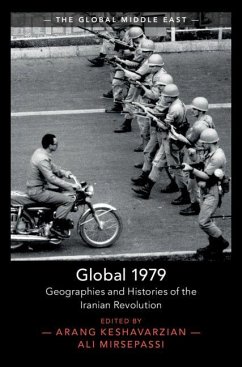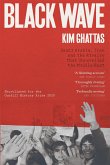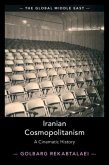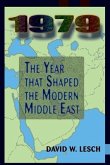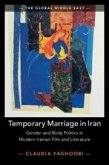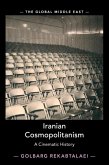Global 1979
Geographies and Histories of the Iranian Revolution
Herausgeber: Keshavarzian, Arang; Mirsepassi, Ali
Global 1979
Geographies and Histories of the Iranian Revolution
Herausgeber: Keshavarzian, Arang; Mirsepassi, Ali
- Broschiertes Buch
- Merkliste
- Auf die Merkliste
- Bewerten Bewerten
- Teilen
- Produkt teilen
- Produkterinnerung
- Produkterinnerung
A multi-disciplinary approach to the study of the 1979 Iranian revolution, offering a way to understand it not as a by-product of a globalization process, or as a singular event but as an expression of wide interconnected networks - highlighting the global processes that made the revolution possible and consequential.
Andere Kunden interessierten sich auch für
![Black Wave Black Wave]() Kim GhattasBlack Wave21,99 €
Kim GhattasBlack Wave21,99 €![Iranian Cosmopolitanism Iranian Cosmopolitanism]() Golbarg Rekabtalaei (New Jersey Seton Hall University)Iranian Cosmopolitanism114,99 €
Golbarg Rekabtalaei (New Jersey Seton Hall University)Iranian Cosmopolitanism114,99 €![Mandatory Madness Mandatory Madness]() Chris Sandal-Wilson (University of Exeter)Mandatory Madness37,99 €
Chris Sandal-Wilson (University of Exeter)Mandatory Madness37,99 €![1979 1979]() David W. Lesch197949,99 €
David W. Lesch197949,99 €![Temporary Marriage in Iran Temporary Marriage in Iran]() Claudia Yaghoobi (Chapel Hill University of North Carolina)Temporary Marriage in Iran40,99 €
Claudia Yaghoobi (Chapel Hill University of North Carolina)Temporary Marriage in Iran40,99 €![Mandatory Madness Mandatory Madness]() Chris Sandal-Wilson (University of Exeter)Mandatory Madness116,99 €
Chris Sandal-Wilson (University of Exeter)Mandatory Madness116,99 €![Iranian Cosmopolitanism Iranian Cosmopolitanism]() Golbarg Rekabtalaei (New Jersey Seton Hall University)Iranian Cosmopolitanism41,99 €
Golbarg Rekabtalaei (New Jersey Seton Hall University)Iranian Cosmopolitanism41,99 €-
-
-
A multi-disciplinary approach to the study of the 1979 Iranian revolution, offering a way to understand it not as a by-product of a globalization process, or as a singular event but as an expression of wide interconnected networks - highlighting the global processes that made the revolution possible and consequential.
Produktdetails
- Produktdetails
- The Global Middle East
- Verlag: Cambridge University Press
- New ed
- Seitenzahl: 478
- Erscheinungstermin: 15. Juli 2021
- Englisch
- Abmessung: 227mm x 153mm x 27mm
- Gewicht: 698g
- ISBN-13: 9781108969741
- ISBN-10: 1108969747
- Artikelnr.: 61261036
- Herstellerkennzeichnung
- Libri GmbH
- Europaallee 1
- 36244 Bad Hersfeld
- gpsr@libri.de
- The Global Middle East
- Verlag: Cambridge University Press
- New ed
- Seitenzahl: 478
- Erscheinungstermin: 15. Juli 2021
- Englisch
- Abmessung: 227mm x 153mm x 27mm
- Gewicht: 698g
- ISBN-13: 9781108969741
- ISBN-10: 1108969747
- Artikelnr.: 61261036
- Herstellerkennzeichnung
- Libri GmbH
- Europaallee 1
- 36244 Bad Hersfeld
- gpsr@libri.de
Introduction Arang Keshavarzian and Ali Mirsepassi; 1. A quiet revolution:
in the shadow of the cold war Ali Mirsepassi; 2. Globalizing the Iranian
revolution: a multiscaler history Arang Keshavarzian; Part I. Global
Shadows: 3. Seeing the worlds from a humble corner: a political memoir Ali
Mirsepassi; 4. Iranian diasporic possibilities: tracing transnational
feminist genealogies from the revolutionary margins Manijeh Moradian; Part
II. Militarized Cartographies: 5. 'In a forest of humans': the urban
cartographies of theory and action in 1970s Iranian revolutionary socialism
Rasmus Elling; 6. Revolutionaries for life: the IRGC and the global
guerrilla movement Maryam Alemzadeh; Part III. Hidden Genealogies: 7. 'A
sky drowning in stars': global '68, the death of Takhti, and the birth of
the Iranian revolution Arash Davari and Naghmeh Sohrabi; 8. 'We must have a
defense build-up': the Iranian revolution, regional security, and American
vulnerability Christopher Dietrich; Part IV. Circulating Knowledge: 9. The
criminal is the patient, the prison will be the cure: building the carceral
imagination in Pahlavi Iran Golnar Nikpour; 10. The cold war and education
in science and engineering in Iran, 1953-1979 Hossein Kamali; Part V.
Aspirational Universalisms: 11. Between illusion and aspiration: Morteza
Avini's cinema and theory of global revolution Hamed Yousefi; 12.
Planetarity: the anti-disciplinary object of Iranian studies Negar
Mottahedeh.
in the shadow of the cold war Ali Mirsepassi; 2. Globalizing the Iranian
revolution: a multiscaler history Arang Keshavarzian; Part I. Global
Shadows: 3. Seeing the worlds from a humble corner: a political memoir Ali
Mirsepassi; 4. Iranian diasporic possibilities: tracing transnational
feminist genealogies from the revolutionary margins Manijeh Moradian; Part
II. Militarized Cartographies: 5. 'In a forest of humans': the urban
cartographies of theory and action in 1970s Iranian revolutionary socialism
Rasmus Elling; 6. Revolutionaries for life: the IRGC and the global
guerrilla movement Maryam Alemzadeh; Part III. Hidden Genealogies: 7. 'A
sky drowning in stars': global '68, the death of Takhti, and the birth of
the Iranian revolution Arash Davari and Naghmeh Sohrabi; 8. 'We must have a
defense build-up': the Iranian revolution, regional security, and American
vulnerability Christopher Dietrich; Part IV. Circulating Knowledge: 9. The
criminal is the patient, the prison will be the cure: building the carceral
imagination in Pahlavi Iran Golnar Nikpour; 10. The cold war and education
in science and engineering in Iran, 1953-1979 Hossein Kamali; Part V.
Aspirational Universalisms: 11. Between illusion and aspiration: Morteza
Avini's cinema and theory of global revolution Hamed Yousefi; 12.
Planetarity: the anti-disciplinary object of Iranian studies Negar
Mottahedeh.
Introduction Arang Keshavarzian and Ali Mirsepassi; 1. A quiet revolution:
in the shadow of the cold war Ali Mirsepassi; 2. Globalizing the Iranian
revolution: a multiscaler history Arang Keshavarzian; Part I. Global
Shadows: 3. Seeing the worlds from a humble corner: a political memoir Ali
Mirsepassi; 4. Iranian diasporic possibilities: tracing transnational
feminist genealogies from the revolutionary margins Manijeh Moradian; Part
II. Militarized Cartographies: 5. 'In a forest of humans': the urban
cartographies of theory and action in 1970s Iranian revolutionary socialism
Rasmus Elling; 6. Revolutionaries for life: the IRGC and the global
guerrilla movement Maryam Alemzadeh; Part III. Hidden Genealogies: 7. 'A
sky drowning in stars': global '68, the death of Takhti, and the birth of
the Iranian revolution Arash Davari and Naghmeh Sohrabi; 8. 'We must have a
defense build-up': the Iranian revolution, regional security, and American
vulnerability Christopher Dietrich; Part IV. Circulating Knowledge: 9. The
criminal is the patient, the prison will be the cure: building the carceral
imagination in Pahlavi Iran Golnar Nikpour; 10. The cold war and education
in science and engineering in Iran, 1953-1979 Hossein Kamali; Part V.
Aspirational Universalisms: 11. Between illusion and aspiration: Morteza
Avini's cinema and theory of global revolution Hamed Yousefi; 12.
Planetarity: the anti-disciplinary object of Iranian studies Negar
Mottahedeh.
in the shadow of the cold war Ali Mirsepassi; 2. Globalizing the Iranian
revolution: a multiscaler history Arang Keshavarzian; Part I. Global
Shadows: 3. Seeing the worlds from a humble corner: a political memoir Ali
Mirsepassi; 4. Iranian diasporic possibilities: tracing transnational
feminist genealogies from the revolutionary margins Manijeh Moradian; Part
II. Militarized Cartographies: 5. 'In a forest of humans': the urban
cartographies of theory and action in 1970s Iranian revolutionary socialism
Rasmus Elling; 6. Revolutionaries for life: the IRGC and the global
guerrilla movement Maryam Alemzadeh; Part III. Hidden Genealogies: 7. 'A
sky drowning in stars': global '68, the death of Takhti, and the birth of
the Iranian revolution Arash Davari and Naghmeh Sohrabi; 8. 'We must have a
defense build-up': the Iranian revolution, regional security, and American
vulnerability Christopher Dietrich; Part IV. Circulating Knowledge: 9. The
criminal is the patient, the prison will be the cure: building the carceral
imagination in Pahlavi Iran Golnar Nikpour; 10. The cold war and education
in science and engineering in Iran, 1953-1979 Hossein Kamali; Part V.
Aspirational Universalisms: 11. Between illusion and aspiration: Morteza
Avini's cinema and theory of global revolution Hamed Yousefi; 12.
Planetarity: the anti-disciplinary object of Iranian studies Negar
Mottahedeh.

